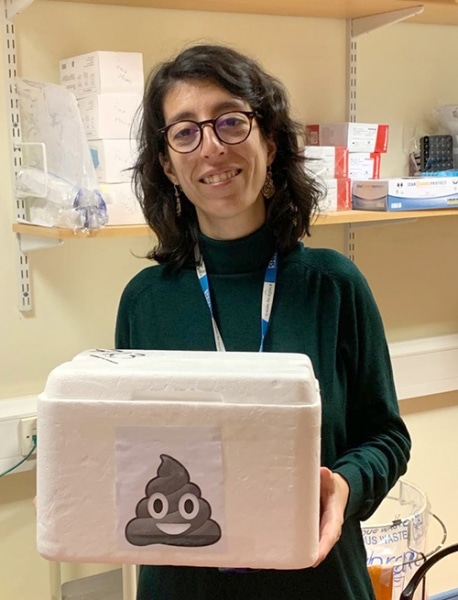The Evelyn Trust is proud to spotlight its pivotal support for a cutting-edge research project at the University of Cambridge. The study delves deep into the intricate relationship between gastrointestinal dysfunction and the onset and progression of Parkinson’s disease and dementia. Led by Dr Marta Camacho and Dr Caroline Williams-Gray, this project has made substantial progress, thanks to the grant provided by The Evelyn Trust.
Exploring the link between gastrointestinal dysfunction and Parkinson’s disease
The primary goal of this research project is to shed light on whether gastrointestinal issues may serve as early indicators of Parkinson’s disease and whether they contribute to and predict the advancement of the disease.
Constipation is one of the most common non-motor Parkinson’s disease symptoms and can significantly impact on the patient’s quality of life. Individuals with constipation are at greater risk of developing Parkinson’s disease and it is now a recognised feature of the onset of Parkinson’s disease. Around half of people with Parkinson’s eventually develop dementia, and this research explored whether gastrointestinal issues were also associated with the onset of dementia.
To achieve these objectives, the researchers examined three groups of individuals – newly-diagnosed Parkinson’s disease patients, individuals at high risk of Parkinson’s disease and healthy controls and evaluated long-term data from their research clinic.
Remarkable key findings
Despite facing unprecedented challenges due to the COVID-19 pandemic, this research project has produced significant successes, thanks to the flexibility and adaptability of the research team. Key findings include:
- Development of the Gastrointestinal Dysfunction Scale for Parkinson’s disease (GIDS-PD): In response to the lack of specific assessment tools for gastrointestinal dysfunction in Parkinson’s disease, the researchers developed and validated the GIDS-PD. This innovative tool allows for the quantitative assessment of gastrointestinal dysfunction in Parkinson’s disease patients. The GIDS-PD was endorsed by the International Movement Disorder Society in 2021 and is now being used in research studies across the world.
- Insights into constipation and Parkinson’s disease progression: The study found gastrointestinal issues at diagnosis could serve as predictors of accelerated disease progression. Constipation severity was associated with faster progression to development of postural instability (difficulty balancing). The association between constipation and survival was also investigated. In a group of patients followed up by the researchers, constipation at the time of receiving a Parkinson’s diagnosis was found to be a predictor of shorter survival.
- Insight into constipation and dementia: The study of 465 Parkinson’s disease patients revealed a significant association between constipation and earlier onset of dementia. By the end of the study, it was found that 20 percent of patients without constipation developed dementia, but those with severe constipation were more than twice as likely to develop dementia (nearly 50 percent affected). The findings support the importance of studying constipation in PD, showing that the presence and severity of this symptom around the time of diagnosis is predictive of subsequent progression to dementia.
- Collaboration with AstraZeneca: The project established a vital partnership with AstraZeneca to analyse microbial DNA in faecal and blood samples, to allow the team to explore how changes in the gut microbiome are linked to immune responses, gut-related symptoms and Parkinson’s progression.
Overall, the results so far show that early constipation affects a subset of patients with Parkinson’s and is associated with an accelerated progression of the disease, although the mechanism by which this occurs is currently unknown.
Looking ahead
This pioneering research promises to provide invaluable insights into the relationship between the gut and brain in people with Parkinson’s disease. By identifying potentially modifiable factors that influence disease progression, this project may pave the way for fresh treatment avenues and improved outcomes for Parkinson’s disease patients.
Dr Marta Camacho said: “All participants were incredibly generous with their time and efforts, donating faecal samples, blood samples, and undergoing comprehensive clinical assessments – we are very grateful to them and hope that our research provides more interesting and relevant findings to the role of the gut-brain axis in Parkinson’s disease.
“However, this project wouldn’t have succeeded without the crucial support of The Evelyn Trust. Through this supportive partnership, we built a platform of knowledge that we hope will inform future clinical trials targeting the gut in neurodegenerative disease.”
Rebecca Wood, Charity Director, said: “The Evelyn Trust is proud to be a partner in this innovative journey towards a better understanding of PD, bringing hope for a brighter future for those affected by this life-limiting disease.”

